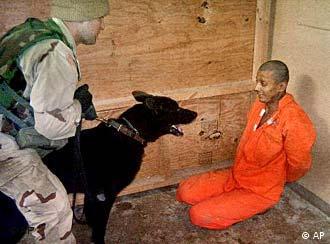Bush's visit to Afghanistan and his Attorney General Alberto Gonzales' visit to Europe seem to have been intended to persuade Europe and the US that everything is going alright in what the US calls the "War on Terror," and that the US still can count on support from key allies.
 The French aren't buying it
The French aren't buying itYet the visits took place against the backdrop of a
prison riot in Kabul, in which at least 6 people were killed, and the release of an
Amnesty International report which claims that at least 14,000 are being head in US custody in Iraq for months and months with no due process and that those in Iraqi custody are regularly subject to torture.
Bush's visit to Afghanistan amounted to little more than a photo opportunity and a courtesy call on President Karzai and American troops. Upon his departure, the prison riot raged, and was finally resolved after days of painstaking negotiation. (One of the principal causes for the riot was according to an ICRC spokesman the Afghan government's decision to force prisoners to wear orange jumpsuits -- yes, the ones associated with Guantanamo Bay.)
Having watched Gonzales take questions after a speech at a prestigious
London thinktank this morning, we can verify that his "defense" of US detention was extremely flimsy. He was vigorously questioned by a skeptical policymaker and journalist audience. He refused to acknowledge the primacy of international law, or even the European insistence on this point, proposing instead that the Geneva Conventions were becoming obsolete.
When asked whether the use of dogs was still allowed in prisoner interrogation, Gonzales could not come up with a correct answer, which is quite simply that
the Pentagon has explicitly banned the use of dogs during interrogation.
(Not surprisingly, Reuters and the AP failed to accurately portray Gonzales' public appearance, merely parroting the points he made during his prepared remarks.
Bloomberg was the only news service to relay the full session.)
Labels: command responsibility, guantanamo, hearts and minds, iraq


























